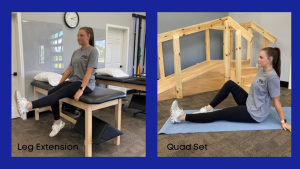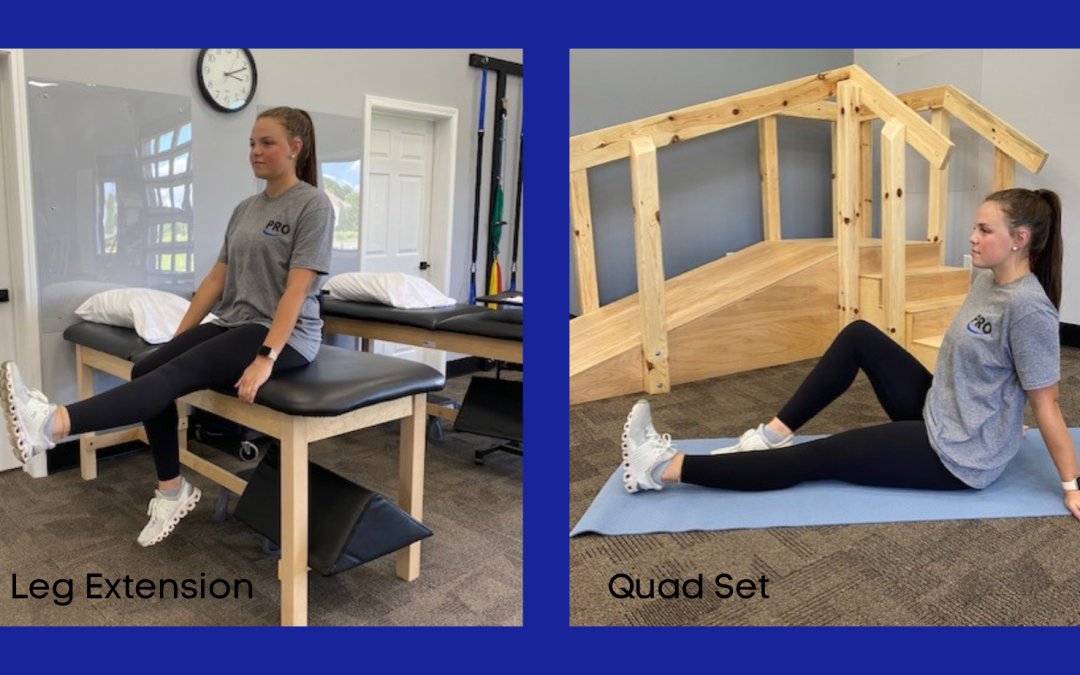Knee Arthritis…”Motion is Lotion”
Osteoarthritis (OA) of the knee is the inflammation and wearing away of the articular cartilage on the knee joint.
In a normal joint, articular cartilage is smooth which allows the bones of the knee joint to slide over each other without rubbing. This slick surface is designed to minimize pressure and friction as you move. Areas where the cartilage is worn down or damaged exposes the underlying bone. The exposure of the bone allows increased stress and compression to the articular cartilage, and at times bone-on-bone contact, which can cause pain. Because the knee is a weight-bearing joint, your activity level influences your symptoms.

Osteoarthritis (OA) is one of the top five most disabling conditions that affects more than one-third of persons > 65 years of age, with an average estimation of about 30 million Americans currently affected by this disease. Currently 80% of persons affected by OA already report having movement limitation, and 20% report not being able to perform major activities of daily living such as grocery shopping or laundry.
Men and women are both susceptible to osteoarthritis. However, research states that women are more likely than men to suffer from OA when over the age of 65 years.
Despite numerous studies over the years, specific causes for OA remain a mystery. Researchers believe that a combination of obesity, aging, and joint injury coupled with genetics ultimately predisposes some individuals to earlier onset than others. What we do know is that repetitive mechanical loads, age, and a sedentary lifestyle play a significant role in the development of OA. Quality of movement is good.
Patients who have knee arthritis can receive help from a physical therapist. A physical therapist at PRO Physical Therapy is a trained musculoskeletal expert who can assess a patient’s mechanics, range of motion, and strength to treat individual’s deficits. Common deficits found in patients who have knee arthritis include:
- Loss of range of motion at the knee joint
- Loss of quadriceps and core strength
Range-of-motion exercises. Poor motion at the knee can lead to a worse symptom by added stress on the joint. ROM loss may be due to decreased joint mobility or loss of flexibility of your muscles.
Muscle strengthening. Decreased strength of muscles around the knee, such as the quadriceps, has shown to increase stress and thus pain on the joint. However, strengthening a patient’s hip and core muscles also can help balance the amount of force on the knee joint, particularly during walking or running and other demanding tasks such as stairs.
However, a therapist at PRO can also help you figure out proper changes in your daily life for management of your OA.
Life Modifications. A patient may help in controlling pain by minimize activities that aggravate the condition, such as climbing stairs or by changing their activities from high impact to lower impact tasks such as (jogging to walking or walking to swimming). Individuals who also focus on losing weight can reduce stress on the knee joint, resulting in less pain and increased function.
Assistive devices. Using devices such as a cane, wearing supportive shoes or inserts, or wearing a brace or knee sleeve can be helpful in management of pain in patient
Patients who receive clinical care and education from a physical therapist have greater improvements in pain than individuals trying to manage symptoms alone. Research has proven that restoring range of motion, performing aerobic activity and including strength training improve pain and function.
No activities are off-limits until your body reacts. You don’t have to stop what you love doing, try moderation and modifications. If you love to run then try changing your shoe type, running surface, mileage, or frequency before giving up.
However sometimes changing the amount of impact on your joints is the key. Here are solid workouts that unload joints for knee arthritis:
- Cycling indoors or out
- Swimming/Water Aerobics
- Walking on land or in water
- Gym Equipment like a Row Machine
Strengthening and Mobility is also key to managing your knees. Programs such as Tai Chi and Yoga can both improve flexibility and strength. You can also take part in a typical gym routine but please seek advice from your PRO physical therapist on a safe workout routine. However, know that you don’t have to be in an exercise class or work out at the gym to help your knee arthritis. Exercises like below can help.

Leg Extension – Start by sitting at the edge of the chair. Kick your leg out with control until it is fully extended. Perform (2-3 sets of 10) 1 time a day. Also, be sure to alternate legs.
Quad Set – Start by sitting tall with legs extended (you can also sit with your back against a wall). Tighten the thigh muscle in the extended leg. Perform (3-5 sets of 20) 2 times a day. Also, be sure to alternate legs.
The bottom line is “motion is lotion.” Movement is the key and being sedentary makes your joints more stiff and painful. At PRO Physical Therapy we want folks to stay safe, independent, and functional. Call PRO Physical Therapy today to make an appointment with a Physical Therapist to help you with your knee pain.
J Pharm Bioallied Sci. 2013 Jan-Mar; 5(1): 30–38.
PMCID: PMC3612336
PMID: 23559821
Current interventions in the management of knee osteoarthritis
Dinesh Bhatia, Tatiana Bejarano, and Mario Novo1
J Am Acad Orthop Surg
. 2007;15 Suppl 1:S22-5.
Sex differences in osteoarthritis of the hip and knee
Affiliations expand
- PMID: 17766785
Stay fit, motivated, and challenged!

Scan our QR Code with your phone to visit PRO Physical Therapy Website!
You can also click on our website link: https://prophysicaltherapyservices.com
270-252-7600
302 US HWY 68 West
Benton KY 42082
Schedule Your Consultation at PRO Physical Therapy
Are you ready to end your muscle or joint pain? PRO Physical Therapy can help you get started today. To find out more about direct access and our physical therapy services in Marshall County, Kentucky, call 270-252-7600 and schedule an initial evaluation and our experienced insurance can verify your insurance coverage.


Recent Comments